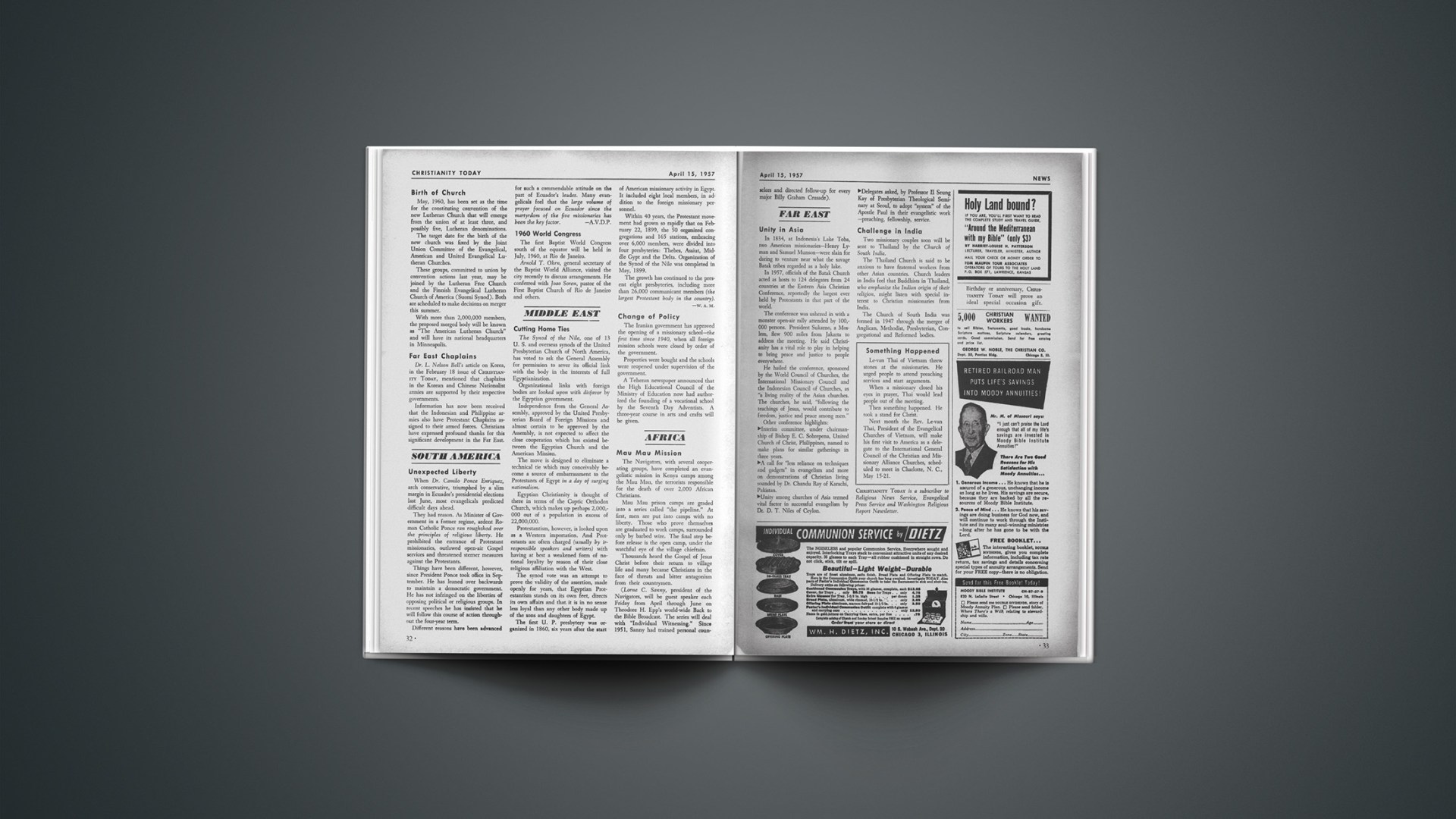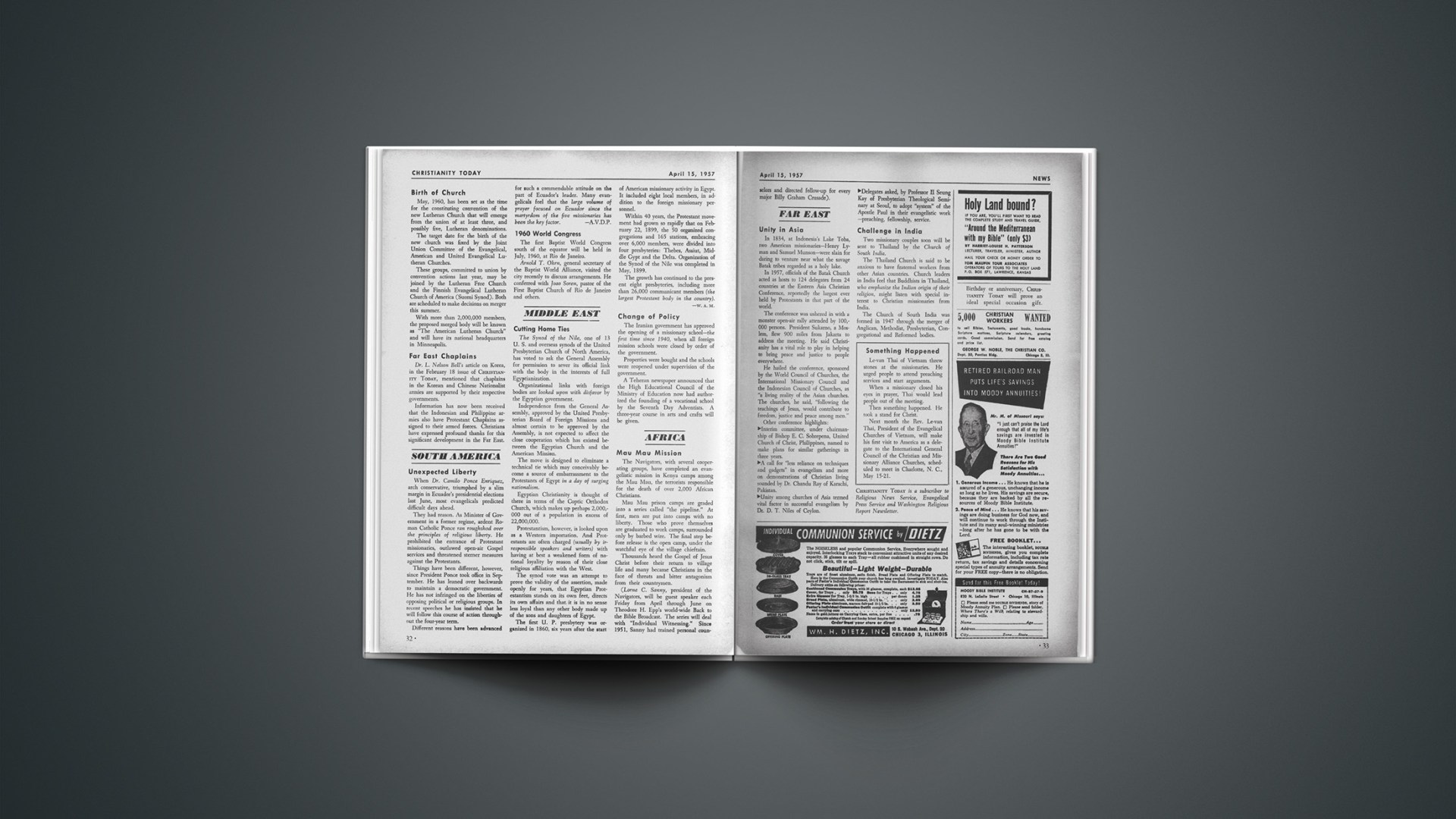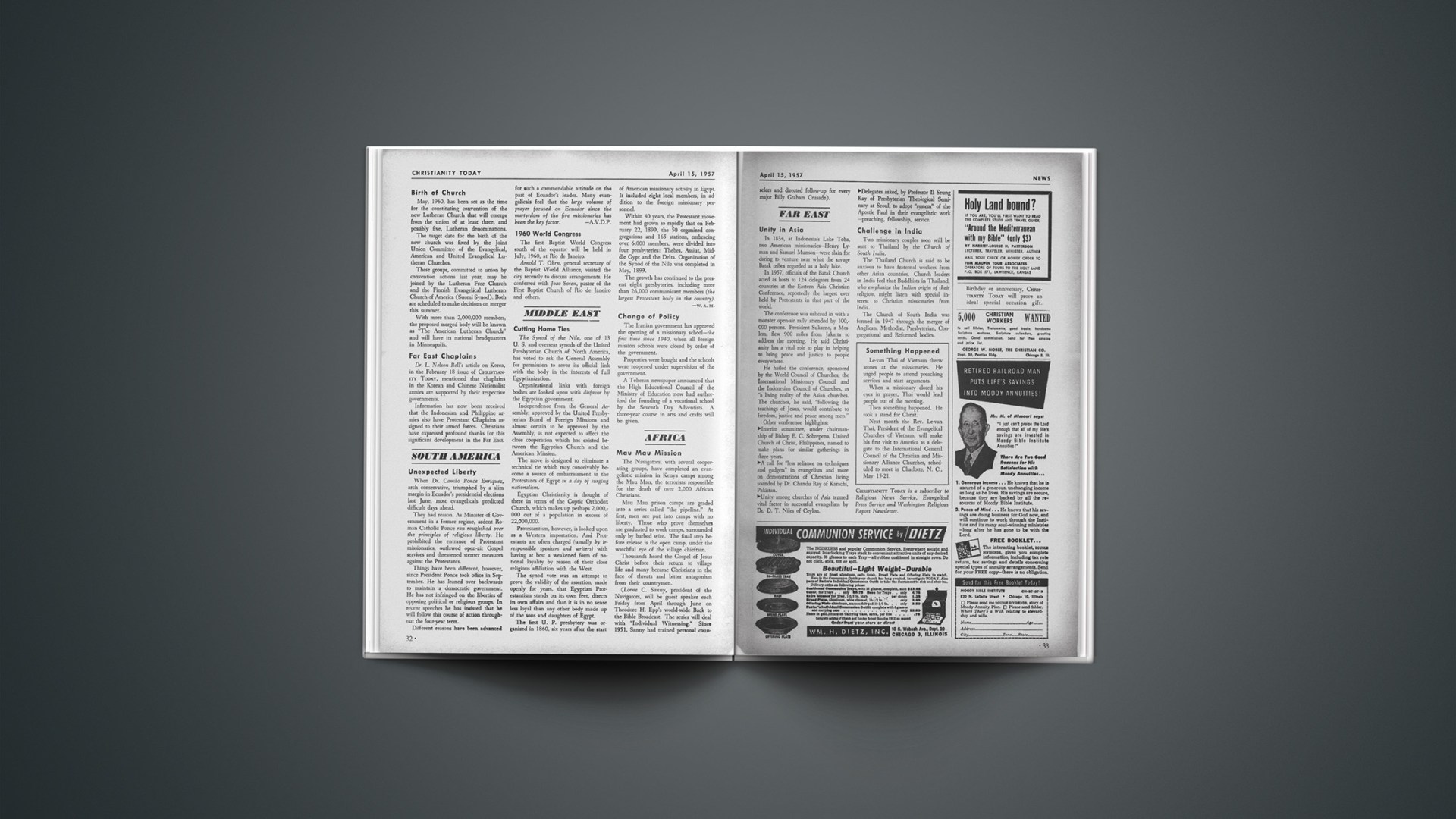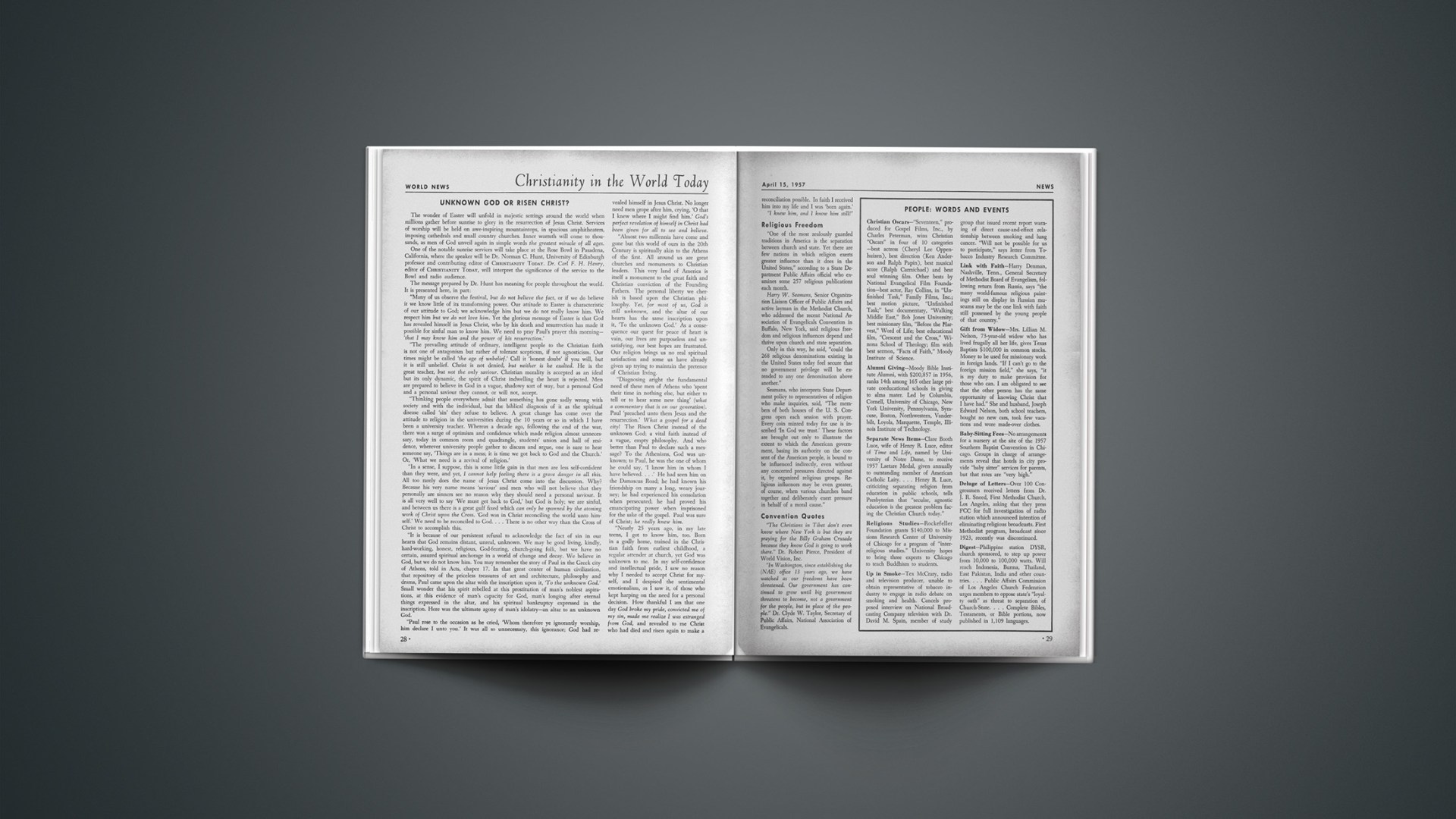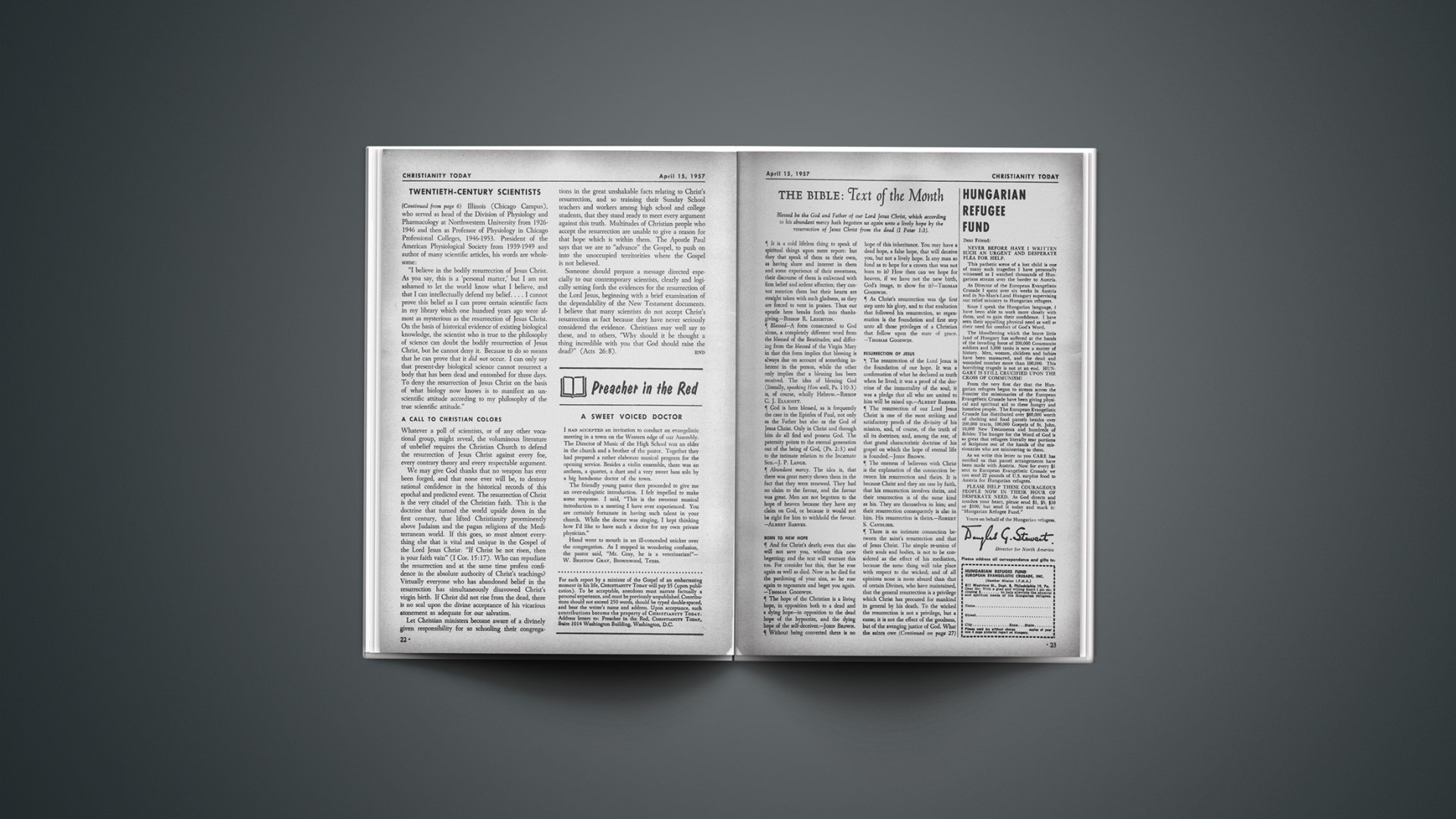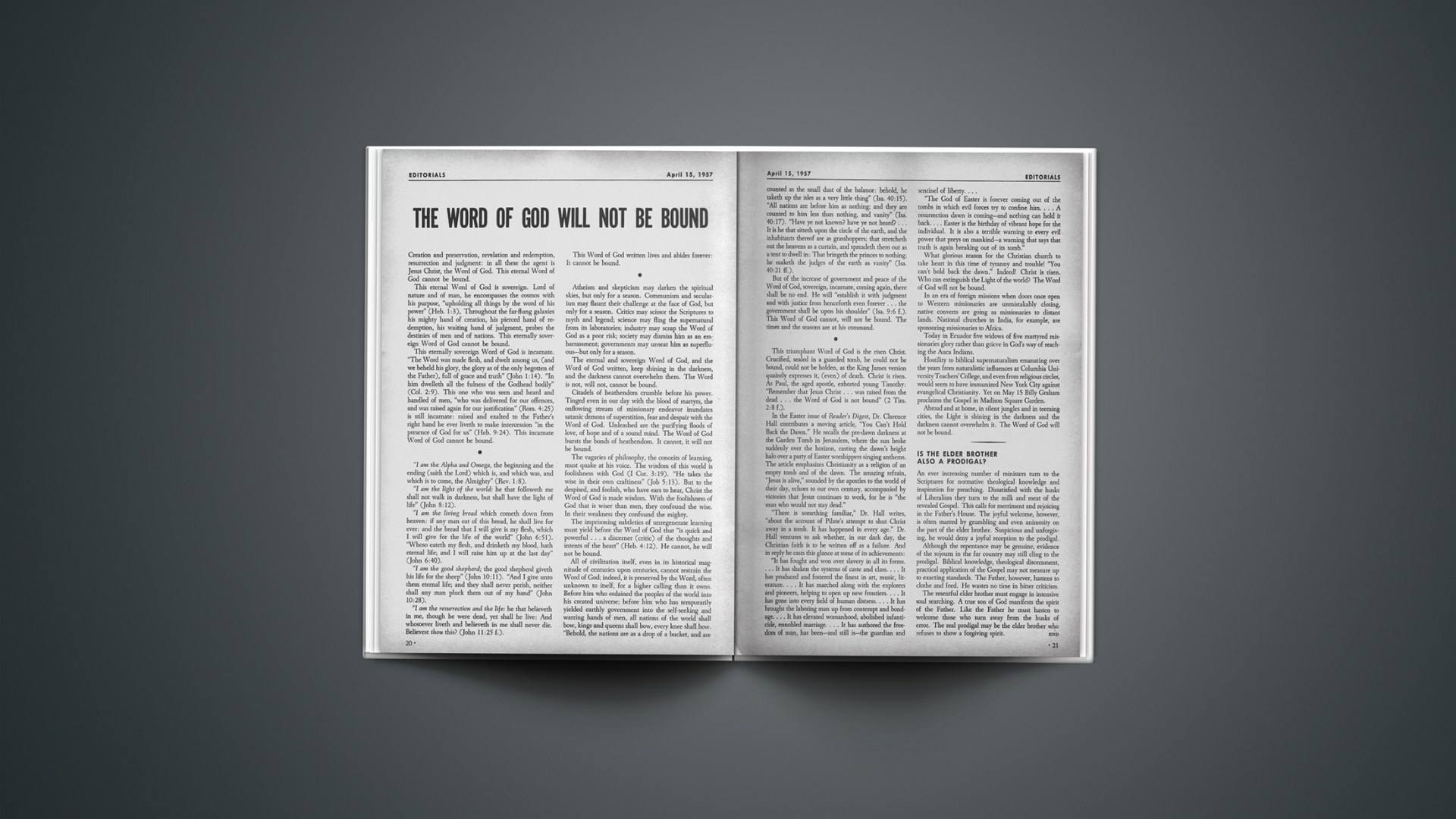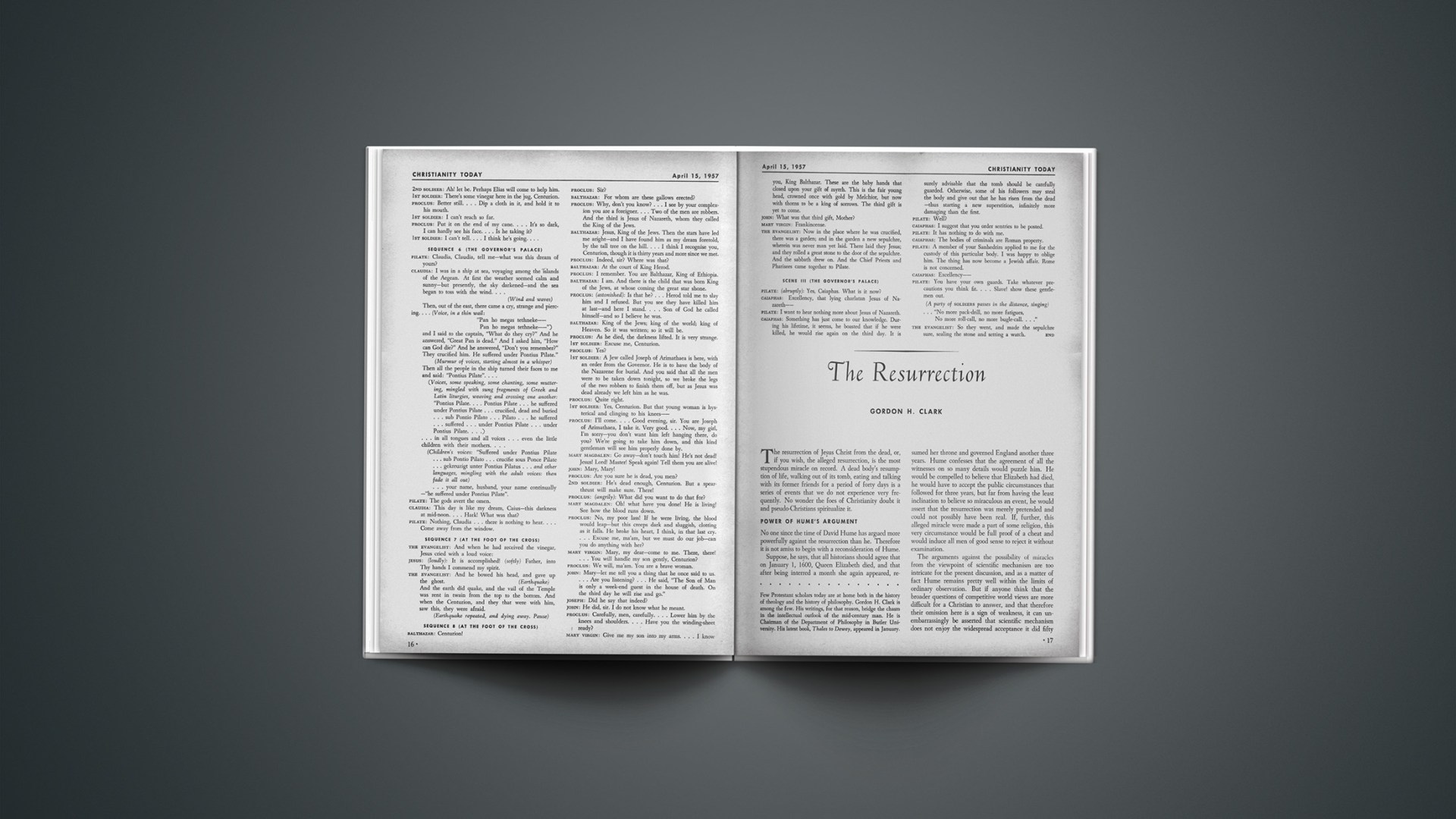Toynbee’s Approach
An Historian’s Approach to Religion, by Arnold Toynbee. Oxford. 1956. $5.00.
Arnold Toynbee’s fame as a historical prophet has already spread far beyond the limits of the academic world. Although perhaps relatively few people have read all ten volumes of his Study of History, a great many have enough acquaintance with some of his ideas through works of popularization and criticism, to appreciate something of his wide knowledge and brilliant generalizations concerning man’s history.
For this reason, the present work under review should be of no little interest to many, particularly Christians, for in his Gifford Lectures of 1952 and 1953 Professor Toynbee has attempted to apply to the history of religion the same techniques he has already used on history in general. He is here endeavouring as he, himself says, to give “The glimpse of the Universe that his fellow-historians and he are able to catch from the point of view at which they arrive through following the historian’s professional path.” (p. 3). And, one might add, this glimpse is both interesting and stimulating, even if one is obliged to disagree.
Toynbee has divided his book into two distinct parts. The first of these divisions deals with “The Dawn of the Higher Religions,” attempting to outline the evolution of man’s religious consciousness from the time that he began his spiritual quest by worshipping nature. He states that man proceeded from that point to the worship of himself, first in “the idolization of parochial communities,” then in the “idolization of an oecumenical community,” and finally in the “idolization of a self-sufficient philosopher.”
Out of these efforts the higher religions eventually arose, reaching their apogee in Mahayana Buddhism and Christianity, both of which “accept Suffering as an opportunity for acting on the promptings of Love and Pity.” Moreover they believe this to be possible because it has already been done “by a Supreme Being Who has demonstrated his own devotion to the ideal, by subjecting himself to the Suffering that is the necessary price of acting on it” (p. 89). These two Beings are the Buddha and the Christ (chap. 6).
Both these religions, it is true have been diverted frequently from their spiritual missions by mundane tasks and have been perverted by the idolization of their institutions, but they still remain the only two ways of approach to Absolute Reality.
This brings us to the second part of the book. Here Toynbee deals with the breakdown of Christian tradition in western civilization. He seems to feel that the present religious situation is the result primarily of the religious conflicts engendered by the Reformation. These he holds, caused a revulsion from Christianity and men found their escape in the study of science which has in turn produced a new false religion: “The Idolization of the Invincible Technician” (chap. 17).
It is this new idolatry which is extremely dangerous, for as the world is becoming more and more bound together, Toynbee feels a world-government must eventually evolve and this will have to be dictatorial. Consequently, the one realm of freedom left for man must be the spiritual. In that situation, man (despite Nazi and Communist examples to the contrary) will be able to express himself fully only in religion. The question is, what will the mans’ ultimate religion be.
The answer to this problem, Toynbee maintains is, to use Bultmann’s phrase a little out of context, to demythologize the higher religions, by clearing away the religious underbrush from around them in order that once again man’s religious heritage may be purified and true religion shown to be the over-coming of self-centeredness through the suffering necessitated by our love for others. In this way man will once again enter fellowship with the Absolute Reality. This is Toynbee’s approach to religion.
As one reads this work, a recurring impression makes itself felt. In a good many ways, Toynbee is very much the eighteenth century “philosopher.” This becomes clear from his continual quoting of Pierre Bayle and Bishop Sprat in his ‘annexes’ to various chapters. But it is also characteristic of his way of thinking. His assumptions, his method and his conclusions are all those basically of the enlightened rationalist—of course in twentieth century dress.
In this connection, the first thing which a Christian notices is that there is no concept of supernatural revelation (p. 265). From the opening pages of the book, he assumes that any possibility of absolute reality speaking to man directly is not worth consideration. This is implied in a number of attacks upon the idea of a chosen people. Even natural revelation seems to have no place in the picture. The absolute reality, as far as one can see, is really the projection of man’s own mind contemplating himself or the world.
For this reason, although Toynbee may speak of sin and redemption, they are rather different from the Christian concepts. Sin is primarily self-centeredness, not rebellion against a God who has called man to “glorify and enjoy” Him. Redemption is to be found, as is natural on Toynbee’s definition of sin, through loving self-sacrifice, which in turn brings man by such good works to fellowship with absolute reality. Redemption by divine grace has no part nor lot in this matter.
And what is this absolute reality? It is very definitely not the Christian God. Since It (to use Toynbee’s word) has not revealed Itself man knows relatively little about It. Toynbee, however, is very insistent the historian knows that it is partly personal and partly impersonal. This would seem to posit within absolute reality an eternally unresolvable surd which can and does produce even for its personal aspect the absolutely new, or at least the unexpected. This is hardly the picture which one receives of the biblical sovereign God unto whom belongs all knowledge and wisdom.
A fundamental question which arises as one considers Toynbee’s thesis is: how does he know all this? How can he make absolute statements about an absolute reality which itself is not completely self-conscious? (pp. 18, 276). One receives the impression that not only is Toynbee’s religion not Christian, it is based upon a contradiction and so is self-destructive.
That this is necessarily so, would seem to arise from his method. He claims that what he is saying is the result of his study of history. But can one, without a prior interpretation of history which is revealed to man, use history which he declares to be apparently chaotic (pp. 9 f.) as a vehicle to go beyond itself to absolute reality? This would seem to be another contradiction in his position. The historian must indeed assume that history has a pattern, but without revelation he must also admit that it is a pattern of his own creation.
Thus, although Professor Toynbee’s book is both very interesting and stimulating, it hardly seems to be the answer which will help twentieth century man to solve his spiritual problems.
W. STANFORD REID
The Future Life
Immortality, by Loraine Boettner. Wm. B. Eerdmans. $2.50.
Dr. Loraine Boettner has earned recognition for himself as a careful and competent theologian with the publication of his earlier writings, especially “The Reformed Doctrine of Predestination”, a classic exposition of a difficult but important truth. In the present volume he again comes to grips with a perplexing, and often misunderstood, subject; death. Much contemporary thought in this area is muddled under the pressure of anxiety, sentimentality, and despair. This book, however, is a refreshing demonstration of rational argumentation growing out of fidelity to, and honest exegesis of, the Scriptures. Here is irresistible logic combined with the exercise of mature faith and spiritual insight. In addition, unlike many modern theologians, Boettner is willing to sacrifice recognition for personal genius, profundity and massive scholarship (to all of which he may lay legitimate claim) in order to be understood by his readers, whatever their theological orientation and acuteness. Even the untrained layman can read these pages without being driven to distraction.
The book is arranged in three sections: Physical Death, Immortality and The Intermediate State. Throughout the subject is treated, not in isolation and abstraction, but in relation to the whole fabric of Christian truth with which it is closely intertwined.
In the first section Boettner makes a sharp distinction between three different kinds of death: spiritual, physical and eternal. He points out that for believers physical death is in no sense penal, in which case it would be superfluous to Christ’s satisfaction on the cross. On the contrary, it is disciplinary in nature. It also serves as a constant warning to unbelievers for whom all three kinds of death are penal.
The second section includes a historical study of the universal belief in immortality and a marshalling of the arguments and evidences which establish the probability and necessity of a future life. Here Boettner indicates that the nature of the matter demands supernatural revelation, and insists that the doctrine is both assumed and taught in the Old Testament, as well as the New Testament and from the very beginning. He then examines and interprets the peculiar Christian teaching about the future life, particularly the resurrection of the body.
The concluding section on the intermediate state is a valuable study of biblical terms such as Paradise, Hades, Sheol and Hell. Here too, are carefully-documented refutations of the erroneous and perverse doctrines of purgatory (Roman Catholicism), soul sleep (Jehovah’s Witnesses and Seventh Day Adventism) and communication with the dead (Spiritualism).
We have no doubt that this book will take its place among the important works on an all-important issue.
RICHARD ALLEN BODEY
The Neo-Calvin
The Theology of Calvin, by Wilhelm Niesel. Translated by Harold Knight. Westminster Press.
Wilhelm Niesel, whose work, here, first appeared in the original German in 1938, wrote this book as a contribution to the lively debate (still going on) devoted to finding a “key” to the understanding of the theology of Calvin. He took pen in hand (like the others) in order to settle once for all the problem for which Kampschulte, for instance, nearly a century ago thought he found the answer in a single doctrine such as that of Election; H. Bauke, more recently, in the form of his theology as opposed to a single doctrine; and H. Weber, in the structural psychology of his system, taking into account both form and doctrinal content. Niesel, decrying all efforts to understand Calvin’s theology from the point of view of its content, declares that the Reformer must be understood in terms of a single, dominant interest, namely the Incarnation. He reflects, in his thesis, the “crisis” theology of the Barthian school, of which he evidently is a member.
Niesel’s thesis is that in order to understand Calvin and resolve the obscurities and contradictions which otherwise inevitably appear, we must set aside any preoccupation with the form or the substance or even the sequence of thought which may seem evident, and look for something more “ultimate.” This “something” is provided by Karl Barth’s theology, whose idea of “theology being determined by its object” has “produced a revolution in Calvin studies as elsewhere.”
In order to develop his thesis, Niesel selects, for consideration, fundamental doctrines taken from the whole body of Calvin’s thought, such as the Knowledge of God, the Trinity, the Law of God, the Mediator, Prayer, the Church, the Sacraments, etc. His materials are selected at random from the whole body of Calvin’s writings. And there certainly are few men living who can equal his knowledge of the sources.
Calvin’s theology, explains Niesel, although centering in Christ, begins with Scripture. Scripture is the source of the divine wisdom which we must acquire and which consists in knowing Christ. But Scripture remains for us, in our unsaved condition, a dead and ineffectual thing. For Niesel’s Calvin, God’s self-revelation is in Christ, not Scripture. And the inclinations of our hearts must be changed if our study of the Bible is not to be so much lost time. This change takes place when we turn to God and is effected by the Holy Spirit. Then it is that we see in Scripture its great subject, Jesus Christ, our Lord. Throughout the entire Bible we are confronted by nothing else but the living Word of God and it is to find him that we study Scripture.
This epistemology, which underlies Niesel’s thesis, is clearly dependent upon a primary doctrine: that of the work of the Holy Spirit. Without this prior work, human intelligence remains unenlightened, the Bible meaningless and Christ unfound. Thus, though the heart of Christianity is Christ, the starting point in soteriology (and the foundation of Niesel’s theology) is the inward illumination of the Holy Spirit.
In most respects Niesel is essentially traditional in his treatment of Calvin, except for the obvious Barthian twist given the Reformer’s view of the Scriptures. But it is precisely the Reformer’s view of the Scriptures which modifies the epistemology Niesel seeks to delineate. Calvin did not believe the Bible a dead collection of words until the Holy Spirit made it the Word of God. He believed it to be the Word of God to begin with, the self-revelation of God which bore within itself the peculiar property of awakening faith as the Holy Spirit granted illumination.
There is a difference between saying that the Bible is a dead book to which a living Spirit must bear witness before it becomes meaningful; and saying that the Bible is the living Word which, when read, stirs and strangely warms the reader’s heart as the Holy Spirit applies the benefits of Christ received through the primary channel of Grace, the Word itself. In my own research, I seemed to hear the Reformer saying the latter. He certainly did not say that we must decide between doctrine and Christ, as Niesel does. He rather affirmed that sound doctrine is the way to find Christ!
The first contact of an unbeliever with the Ultimate Word is not at the point of the inward illumination of the Spirit, but in the preaching of the proximate Word. Then it is precisely because the Bible is intrinsically the dynamic Word of God that it serves as a channel through which the Holy Spirit speaks to human hearts about Christ. True, Calvin did not believe that the divine inspiration of the Scriptures could be demonstrated to all and sundry, as Niesel points out. But this was because this primary channel did not pour the saving Grace of God by the Holy Spirit into every heart: according to the Reformer’s doctrine of Election. (To some the preaching of the Word remains foolishness.) The difference is fine, but significant.
But this is an important book, without a consideration of which any serious Calvin research would be incomplete. Despite his attempt to make Calvin a Barthian, very few modern scholars know the Reformer as well as the author of this profound study. And if this had not come from his pen he would still be in the front rank of Calvin scholars by reason of the five-volume critical edition of primary sources which he co-edited with Peter Barth, the I. Calvini Opera Selecta, the last of which appeared only in 1952.
G. AIKEN TAYLOR
Though Dead, Still Lives
Commentary on the Prophecies of Isaiah, by Joseph Addison Alexander. Zondervan, Grand Rapids, 1953. $8.95.
The Psalms, Translated and Explained. Zondervan, Grand Rapids. $6.95.
Though dead, Joseph Addison Alexander still lives. A century ago, he spoke to the hearts and minds of the people of God; today, as his words have once more found their way into print, he speaks again. Some men live and die, and their memory perishes with them. In other instances, following the sunset there is a glorious afterglow but gradually the light fails and darkness reigns. It is therefore no mean tribute to the worth of a man’s work when succeeding generations find it of such worthy nature that his writings are again given wide distribution and become anew the means of our understanding that which God has spoken.
With the reprinting of Alexander’s Commentaries upon Isaiah and the Psalms, treasures which had long lain more or less buried and forgotten have once more come to light and are making it possible for us to live again in the days of the prophet-statesman of Hezekiah’s court and the sweet singer of Israel.
The author, a distinguished linguist and student of Oriental literature, an apologist of no mean ability, an historian and an exegete, for many years taught with unusual success in Princeton Theological Seminary. In the course of his studies, he amassed a body of information upon the Book of Isaiah which was characterized both by its extensiveness and by its penetrating analysis of the teaching of the Book.
The one who reads Alexander has before him three types of material, all three of which serve to aid him in understanding the text. The first of these is the author’s translation of the Hebrew, verse by verse as the discussion proceeds, a feature most helpful both to the reader who wishes to check the translation against the original language and to the one who merely wishes to have the text immediately before him so that he can appreciate fully the comments upon its various parts.
The second feature of the author’s approach is his careful analysis of the content. He endeavors to show to his reader the thought of each great segment of the book as well as that of each subdivision, each verse, each phrase, each word. He does this upon the basis of the original language, but in such fashion that the student who is not conversant with Hebrew can still follow the essential development of ideas—this in contrast to some parts of the excellent commentaries by Keil and Delitzsch.
There is a certain freshness to a commentary which makes no attempt to inform readers as to the reasoning of other exegetes, ancient and modern, regarding the interpretation of a point in question, but if one is to be a serious student of Scripture he cannot do other than to compare and contrast, to reckon with each suggested interpretation, to test each possibility against the biblical phrasing. The third aspect of Alexander’s treatment makes such checking possible, for he outlines the interpretations of others in great detail. Not only does he do so, but he analyzes these interpretations and sifts and weighs the evidence for each, leaving the reader no excuse for jumping hastily to unjustified conclusions. If the approach chosen makes for a more ponderous volume and is annoying to some, let it be remembered that Alexander’s Commentaries are designed more for study than for inspiration, but who shall deny that from devoted study comes often the deepest, most abiding inspiration!
Dispensationalist and non-dispensationalist alike will do well to evaluate Alexander’s treatment of prophecy. For him, the national pre-eminence of the Jews was “representative, not original; symbolical, not real; provisional, not perpetual …” (p. 52). He sees with Isaiah a carnal Israel which has not perceived this truth, but at the same time he sees a spiritual Israel, the true Church.
He sees a personal Messiah, who will come as a deliverer and bring his people into glorious liberty. He sees a Church of the future, not in its chronological outlines, but as one blaze of glory, the perspectives and details of which must wait for the fuller revelation of the New Testament.
His treatment of the Psalms is similar to that found in the volume on Isaiah except that he does not state or discuss the interpretations of others. Originally, his intention was to produce a translation only, but as he gave himself to the task he felt constrained to record exegetical comments in order that the translation might become more meaningful.
He sees the Psalms not as unrelated individual compositions but as pairs, as trilogies, as topical groups, as an organized body of liturgical material for the use of the Church.
He disavows a devotional intent in making his notes, but the commentary is markedly that of one who is consciously standing upon holy ground, and the reader whose extra-biblical knowledge of the Psalter does not include the musings of Spurgeon and others cannot fail, upon reading Alexander only, to take his shoes from off his feet, as it were, and to cry, “Holy, holy, holy, is the Lord of hosts: the whole earth is full of his glory.”
The volumes under review are worthy of a place in the pastor’s library, and the well-read layman will consult them with profit.
BURTON L. GODDARD
Clearer Insights
The Gospel of Mark, by Ralph Earle, Th.D. Zondervan, $3.95.
This is the work of a thorough-going scholar. The bibliography reveals the author’s broad acquaintance with commentators and theologians of many periods. The Introduction provides a brief but valuable summary of textual criticism, a subject most ministers tend to neglect after leaving the seminary. Yet with such scholarly emphasis the author writes in a clear, concise style that makes the volume useful and instructive to both ministers and laymen.
Although effective use is made of the findings of numerous other authors, this book is far more than a compilation. The writer presents old truths with freshness and imagination, showing that his academic preparation has been matched by a devout search for spiritual illumination. While even a casual sampling of the content reveals Dr. Earle’s consistently high standard of scriptural exposition, the portion dealing with chapter 9:42–50 seems especially excellent. In an age when reproach has been cast upon the Word of God by faith-destroying humanism as well as by fanatical interpretations and actions of misguided literalists, the explanations found in this part of the book are greatly needed. It is significant to note that, while our Lord authorized and qualified his disciples to amplify and complement his own teaching, the subjects of hell and eternal punishment were first expressed clearly and completely by Christ before being committed to them. This commentary should prove a great boon to pastors, Sunday school teachers and all others who wish to gain clearer insights into Mark’s account of the life and teachings of Christ.
ERIC EDWIN PAULSON
Journey To Christianity
Surprised by Joy, by C. S. Lewis. Geoffrey Bles, London. 15/-.
The autobiography of a layman who has had a profound influence in British theological and religious circles in recent years is an event of considerable interest. He tells the story of the journey which led him from a school-boy’s religion into atheism, and later back to Christianity. It is in the true Lewis tradition—with that strain of independence and puckish humour which characterise his writings.
Lewis was born in Belfast in an Episcopalian (Church of Ireland) home where there was little evangelical influence. He spent most of his youth in boarding schools and in the course of his life such religious life as he had was destroyed by an insidious subjectivism. In the progress to atheism, the author could never feel quite sure that he was right and that Deity could be altogether excluded from the universe.
His confidence in scepticism was rudely shaken by meeting a friend in a classroom in Oxford whom he describes as “a Christian and a thorough-going super-naturalist.” Finally in the Trinity Term of 1929 Lewis gave in and admitted that God was God; and knelt and prayed … the most dejected and reluctant convert in all England.
I did not then see what is now the most shining and obvious thing; the Divine humility which will accept a convert even on such terms. The Prodigal son at least walked home on his own feet.”
The conversion of Lewis was at first to Theism rather than to Christianity, but he was moving to a more personal faith. The quality of the faith he received is clear from the books which he published during the war years and since.
Incisive is the analysis of the author concerning the twilight of religion during the years of early manhood. He makes a telling reference to a “Gabbling, a tragic Irish parson who long since lost his faith but retained his living” and who devoted himself to searching for evidence of human survival. Surely this is not an inapt description of a twentieth century Christendom, which Lewis has analysed so skilfully on various occasions.
S. W. MURRAY
Of Practical Value
Health Shall Spring Forth, by Paul E. Adolph, M.D. Moody Press. $2.50.
Dr. Adolph, student and graduate of Philadelphia Bible Institute and Wheaton College, obtained honors upon his graduation from the School of Medicine of the University of Pennsylvania. After internship and residency he served as missionary under the China Inland Mission until 1949, with time out for study and research in surgery and four years in the U. S. Army Medical Corps. He is a fellow of the American College of Surgeons and is at present instructor in first aid and minor surgery in Moody Bible Institute.
Dr. Adolph’s aim “has been to stress the importance of the emotional tension diseases, and to point out the limitless resources at the disposal of the Christian to eliminate them through maintaining a healthy outlook” (p. 124). In no sense has he attempted to present the care for all mental diseases but has limited his treatment to some outstanding causes of emotional tensions and how to treat them from the standpoint of Christian supernaturalism when the layman has insight to apply Christian therapeutic principles.
In psycho-somatic ills he sees three “common tension patterns” which are focused in the organism and explains the emotional basis for those bodily ills which may be mitigated by spiritual therapy. He calls these: (1) the stiff-neck tension pattern, often issuing in compulsive behaviour not amenable to diagnosis by counsel, resistant to any change of ways; (2) the chest tension pattern, suggesting heart malfunction through a feeling of chest constriction, and depression; and (3) the stomach tension pattern, often described as nervous indigestion, with oft-accompanying abdominal tension, vague nausea; related to a general feeling of being “fed up,” often complicated by real peptic ulcer.
He thinks that no properly instructed Christian in a condition of full surrender to his Lord’s will need be a victim of emotions. He thinks that the emotionally disturbed Christian may always find a cure for all psycho-somatic symptoms and disturbances.
Employing the nomenclature of Scripture Dr. Adolph shows how a disturbed Christian may arrive at a healthy spiritual state by a proper resolution of his psycho-somatic ills. He discusses these problems as basically spiritual and gives several chapters to these in the areas of perfectionism, fears, the unforgiving spirit, doubts, indecisiveness, lack of orderliness, failure to appreciate the spiritual heritage and lack of Christian love.
There is a sound chapter on faith healing as well as one on spiritual maturity.
This non-technical, sympathetic, understanding summary of the Christian’s psycho-somatic ills may prove of greatest value to any Christian who would rightly live for his Saviour, for here are sound techniques of spiritual therapy. Dr. Adolph notes, however, that some Christians may have come to such a state as to be genuinely psychotic and in need of psychiatric care.
Every Christian will profit by reading and circulating this volume. It will prove of value to the minister in dealing with emotionally disturbed Christians.
WALTER VAIL WATSON
Highly Competent
Christian Theology and Natural Science. The Bampton Lectures, 1956, by E. L. Mascal. Longmans, Green and Company, 1956. $4.50.
This treatise is not about specific passages of Scripture and findings of empirical sciences, but about particular theological teachings of the Scriptures and contemporary scientific theory. The author, an accomplished mathematician, is an orthodox Anglican who has accepted Thomism, as his theological and philosophical framework. The entire work is characterized by an unusual high order of competence—theological, philosophical and scientific.
Having written a treatise of my own on the subject (The Christian View of Science and Scripture), I found it an interesting experience to read this work. It was startling to find similar sectional headings, and at times exact correspondence in theses defended. I will not challenge the patience of the reader by making comparisons save to state that my position is closer to Mascal’s than American orthodox literature on the subject.
Mascal’s thesis is: “What I have tried to do is to show, by discussing a certain number of matters in which both theology and science have an interest, that it is possible to be an orthodox Christian without either ignoring or repudiating the discoveries of present day science” (p. 291).
Two basic assumptions of the book are: (i) The value of the Bible is its theological meaning, and any attempt to find empirical scientific data in Scripture is wrong (cf. p. 99) (ii). A metaphysical and theological explanation and a scientific explanation are on two different levels. The former does not derive its validity from the latter, and the former may or may not be in harmony with the status of science at any given time. Thus the doctrine of creation does not depend upon cosmological speculations, but upon theological and metaphysical principles.
His general attitude is that twentieth century science is more favorably disposed to Christian faith than nineteenth century science, but that the Christian is not to boldly proclaim that modern science has verified many Christian dogmas. In the previous century scientific laws were taken as absolutes; in the current century as statistical approximations subject to constant revision. In the previous century scientific theories were considered as literal interpretations of reality; today theories are considered as models, not true or false, but useful or not useful.
Other items of interest are: (i) he does not believe modern astrophysics proves creation but follows the position of Aquinas which is too involved to explain here; (ii) he defends the virginal conception of Christ and New Testament demonology; (iii) he believes there was a fall of angels prior to man’s fall and this accounts for pre-human evil in the universe (p. 36); (iv) he censures modernism, logical positivism and ‘narrow biblicism’; (v) he believes in the possible polygenetic origin of man for the unity of the race is not biological but spiritual or metaphysical [he mentions the Russian biologist-priest who thinks having located the gene bearing human depravity he could knock it out with radiation!]; (vi) he asserts that only ‘obstinate fundamentalists’ oppose evolution and that the method of man’s creation is completely secondary to the that of his divine origin; and (vii) the older theologians of the church would not be disturbed one bit by modern attempts to create life from organic compounds.
BERNARD RAMM



